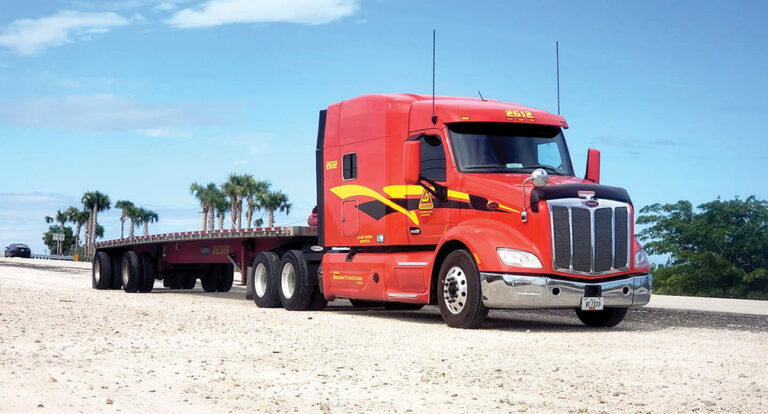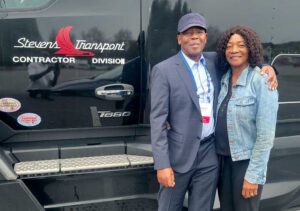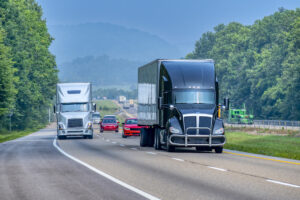Successful companies are often called to be flexible enough to change with the business climate while holding on to their core values. Decker Truck Line, based in Fort Dodge, Iowa, has come a long way from the single truck driven by Loren Decker — at the age of 16 — back in 1929. Trucks in those days were mostly automobile models with gasoline engines and shortened bodies that allowed for the installation of a bed or box.
“It kind of grew from there,” said Decker Executive Vice President Dale Decker, adding that his grandfather and namesake, the first Dale Decker, joined his older brother Loren after returning home from service in World War II.
“We have had some very long-term customers over the years,” he continued. “We hauled our first load of plumbing fixtures for Kohler back in 1935 and continue to haul for them to this day.”
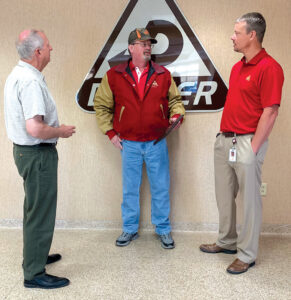
Nearly a century later, Decker Truck Line is still family owned. Various members of the Decker family participated in the ownership until 1993, when Don Decker, the company’s current president and chairman of the board, acquired sole ownership. Dale is Don’s son, as well as co-owner of the company.
Over the years, Decker diversified its freight mix, which currently includes dry van, refrigerated, and flatbed freight.
“Refrigerated has kind of been our bread and butter for years,” explained Dale. “But also, being in Fort Dodge, Iowa, we’re across the street from major gypsum plants, so we’re heavily in flatbed for sheet rock.”
Currently, three of the company’s six terminals are located in Iowa, in Fort Dodge, Des Moines, and Mediapolis. Facilities in Bessemer, Alabama, Hammond, Indiana, and Missoula, Montana, round out the terminal locations. Dale splits his time between the Des Moines logistics office and the Fort Dodge assets office.
Dale said he sees a difference in today’s business climate compared to past years.
“In addition to having our trucks that help give us our market presence and legitimacy, we’ve got to be more than just a trucking company,” he noted. “We’ve got to find business solutions that are more for the future, too.”
He also explained that the company is integrating its asset and non-asset segments to offer a “larger solution” to customers, and spoke of the challenges of moving the company into the future.
“It’s a ‘where do we go from here?’ standpoint,” he said. “What’s going to take more reinvestment in the company and in what areas? Are we putting the right focus in the right areas to not just be a trucking company, but to be a true freight solutions provider?”
The trucking industry is facing other challenges as well, such as managing the
transition from diesel to non-emissions power sources and adding autonomous vehicles — two technologies that will undoubtedly merge in future fleets. Decker Truck Line is keeping a close eye on the technology. Like most irregular-route carriers, however, the equipment has to be right for the application, and it has to work economically.
Dale’s caution comes from his experience with another breakthrough technology.
“Back in the late 2000s when everyone was looking at biodiesel solutions, we did a lot of exploring there,” he remarked. “We did a published study in partnership with the National Biodiesel Board, the EPA, the USDA, CAT, and Iowa’s Central College.”
Decker Truck Line assisted in the research with a field study of the fuel to discover how it could work, “not from a theoretical standpoint but from an actual use standpoint,” he shared. “With our findings from the study, we have been brought into the (Iowa) legislature multiple times to testify about our experiences and against any mandates.”
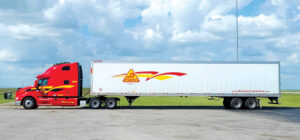
As for commercial electric vehicles, Dale is taking a wait-and-see approach.
“I don’t see an offering right now that fits what we would need, but we’re definitely open to it,” he said. “The electric thing seems to be happening faster than I would have anticipated on the consumer car side of things five or 10 years ago.”
When asked about his company’s biggest challenge, Decker didn’t hesitate.
“Surprise, surprise — that’s the driver situation,” he said. “We’re not just going out there and chasing drivers, throwing money in front of them to attract them. We’re really looking at everything, what kind of job we’re offering.”
Decker Truck Line works with Workhound, a Chattanooga, Tennessee-based provider that receives feedback from drivers and recommends steps to improve retention. “They’ve been really good about getting us in touch with our drivers,” he remarked.
Like many trucking decision-makers, Dale wants to avoid the endless loop of raising driver compensation and then chasing rate increases to compensate. The company website states the average tractor age is just 1.9 years, and that they’re equipped with APUs, inverters, bunk heaters, refrigerators, microwaves, and television with satellite service, on top of disc brakes and other safety technology.
“We’re providing drivers with pretty new equipment quite regularly, and when it’s time for them to jump in a new truck, we can swap them in and out easily with less things for them to have to unmount and move,” he said. “A lot of the amenities are just standard, and every driver knows what to expect in the next truck.”
Keeping new equipment coming in to keep the fleet young has been challenging this year.
“We were able to get some trucks in that were kind of trade deals that we had worked with the OEMs,” added Dale. “They knew that they had to get these trucks on to their next marketplace, so they’ve got to get us provided with trucks.”
The current backlog of truck orders is a concern Dale wants to get ahead of. “We’re trying to make decisions to get trucks on order for next year,” he said. “We don’t have a lot of time to waste hours around trying to figure it out. We’ve got to get these things on order for next year.”
As changes continue for the trucking industry, Decker Truck Line wants to stay ahead of the curve.
“We want to be one of those companies that you look at in 20 years and say they were laying the foundation, the right kind of business model 20 years ago,” concluded Dale.
That’s a strategy that has worked for more than 90 years at Decker Truck Line.
Cliff Abbott is an experienced commercial vehicle driver and owner-operator who still holds a CDL in his home state of Alabama. In nearly 40 years in trucking, he’s been an instructor and trainer and has managed safety and recruiting operations for several carriers. Having never lost his love of the road, Cliff has written a book and hundreds of songs and has been writing for The Trucker for more than a decade.







